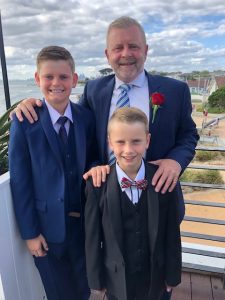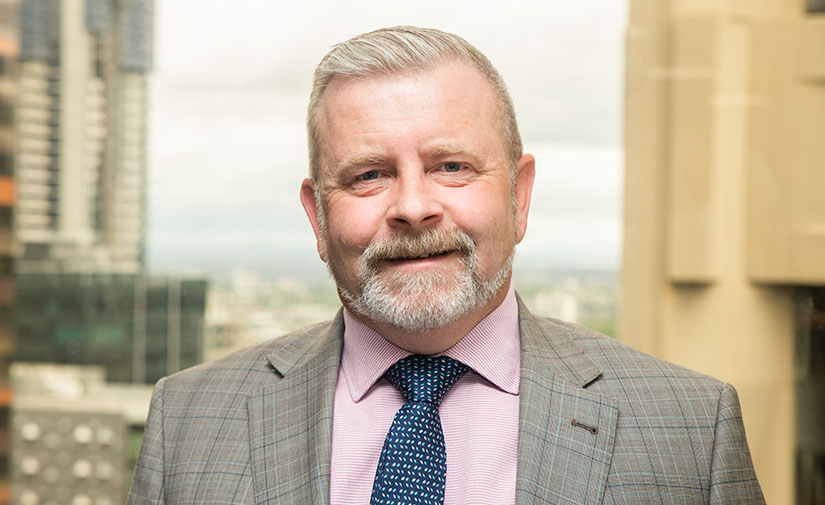Andrew Mattinson, Jirsch Sutherland’s Melbourne-based Principal, loves to give back to his community – and that’s a key reason why he joined Jirsch Sutherland. Their shared values were a “good fit”, he says.
Andrew first realised the firm and the Melbourne team would be a good fit for him when he was interviewed in late 2019 by Victorian Managing Partner Glenn Crisp and Partner Malcolm Howell. “In the interview, I gained an appreciation of Jirsch Sutherland – but more particularly, the characters of Malcolm and Glenn who, like me, are more laidback than regimented, and their values aligned with mine,” he says.
“With Jirsch Sutherland’s national reach and dedicated shared services model, I also knew it would be an environment that would suit me and that I could make a difference at the firm.”
Andrew has been making a difference in his local community for many years. He has been Treasurer and Board Member with Volunteering Victoria, an Emergency Department Assistant at Richmond’s Epworth Hospital, head coach of a local football team, and an Auskick coordinator for five years. “At the hospital, I assisted with patient transfers and ran blood and x-rays to the relevant departments, changed bedlinen, made cups of tea and sandwiches for patients and dropped by to chat to those who had not received any visitors,” he explains.
Andrew has also held the role of Duty Coordinator at his sons’ Little Athletics Club for the past six years and has been the club Treasurer. “I feel that it is only right that if my child is a member, that I should contribute. I believe everyone should make a contribution to the community for some period of their lives,” he adds.
Falling into insolvency
 Like many others in the insolvency sector, Andrew says he “fell into insolvency”.
Like many others in the insolvency sector, Andrew says he “fell into insolvency”.
“Upon completion of my undergraduate studies at 33-years-of-age, I answered a graduate advertisement by an accounting firm. After the interview, they thought my skills were well suited to insolvency as I had worked in the credit section of the State Bank, reviewing financials and doing analysis of company accounts, and thus had a good relationship with banks,” he says.
He admits that at the time, he had little understanding of what insolvency was about: “I’d come across liquidations when I worked in banking; that was the extent of my knowledge.”
Today, Andrew is a Registered Liquidator with over 20 years’ experience working on a wide range of insolvency and restructuring matters across many sectors. And he has an unstoppable willingness to roll up his sleeves and help – both at work and on weekends. “I enjoy working with my colleagues, helping others and restructuring entities to retain a viable business which keeps staff employed rather than shutting operations down,” he says.
Andrew credits his personable manner and honest, straightforward approach for his ability to build good rapport with people. “For better or worse, I am truthful. It is important to me that advisers, directors and employees understand what they are getting into and what assistance I may or may not be able to provide,” he says.
He also credits having a good sense of humour and being able to “read the ‘crap’ from fact” as important qualities to have in insolvency, particularly when dealing with challenging and unusual matters – like the voluntary administration of a brothel (“The brothel staff were great once they knew they could continue to work and earn. However, being a cash business, it created some challenges. But we worked them out,” Andrew says); and trading a steel fabricator in a large regional hub. “Some employees took tools and equipment; others didn’t turn up for work. And the local townspeople were abreast of all the issues through word of mouth, which made the company more challenging to sell,” recalls Andrew.
 As a ‘people person’ with a passion for giving back, it’s not surprising to learn that the sectors Andrew enjoys working with the most are those that provide a service. “The interaction between people, such as in health and volunteering. Anyone can make a widget but to provide your own personal service makes a real difference,” he says.
As a ‘people person’ with a passion for giving back, it’s not surprising to learn that the sectors Andrew enjoys working with the most are those that provide a service. “The interaction between people, such as in health and volunteering. Anyone can make a widget but to provide your own personal service makes a real difference,” he says.
On the topic of insolvency being ‘misunderstood’, Andrew believes it is largely due to many people not being aware of the good outcomes that practitioners achieve, and not having an understanding of the challenges, scrutiny and legislative requirements they have to adhere to. “There is no education provided in either under or post-graduate studies that provides students with an understanding or appreciation of the insolvency sector,” he adds. He sees education as a way to change this perception.
One of Andrew’s key aims is to establish new relationships with referrers and clients throughout Victoria, locally and regionally, with face-to-face visits now back on the agenda.
Work and volunteering aside, on weekends Andrew looks forward to seeing his team – Essendon – on the footy field; playing with his German Short-haired Pointer puppies, Coco and Penny; and watching his sons Fraser and Camden play AFL. “My boys are my world. I love seeing them participate in whatever they do, and I love going on holidays with them, as we did to Darwin over Easter,” he adds.


